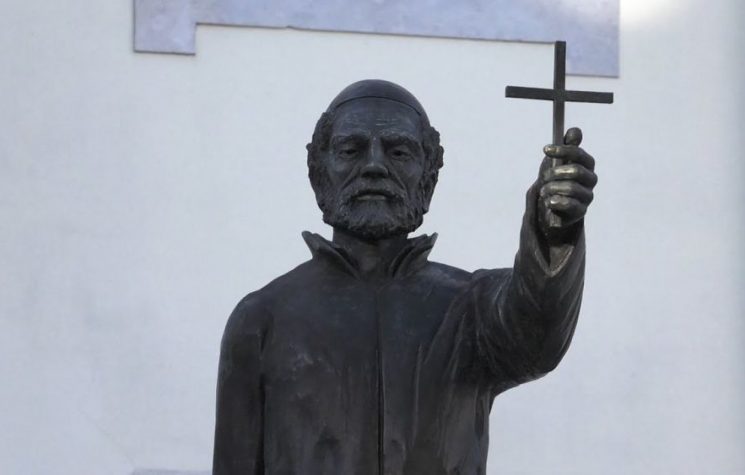Even though Jews have a propensity of keeping certain cultural unity in diaspora, Brazil gives them the freedom to be a just an individual person, reducing the group pressure over a Jew.
Contact us: info@strategic-culture.su
Even with all romanticism around Holocaust, and an intense presence of the Left in cultural life, the issues of antisemitism and Zionism had to wait for Hamas’ offensive on October 7th, last year, to draw real attention in Brazil. During this short period of time, an attentive Brazilian gentile will have realized that the politicization of Judaism is particularly intense in USA, and that, wherever there be a noisy anti-Zionist activist, that’s probably a left-wing Ashkenazi jew – and not, say, an Arab. There is a huge Arab presence in Brazil, but it is not very relevant for pressuring for Palestine. On the other side, in USA there is a huge Ashkenazi Jewish presence, and it is at that country that students can draw people into camping for Palestine.
The explanation is simple: not every Arab country is an enemy of Israel, and Brazilian people of Arab ancestry are not claimed by national states on the other side of the globe. Brazilian Jews, however – specially Ashkenazi Jews, who invented the Zionist movement – have on the other side of the globe a national state which rests its legitimacy on claiming to be theis only safe space in this world filled with antisemitism. Then every barbarity perpetrated by Israel is made for their sake, especially if they have Holocaust victims in family history. If a gentile is appalled with Israel’s barbarities, a left-wing Ashkenazi Jew is also personally offended and outraged. (Even though Zionism has been a lay left-wing movement during a part of its history, now it is mainly a right-wing and religious thing.)
Other thing worth of noticing is the propaganda of americanophile Right (specially if evangelical and economical liberal), which tries to make Brazilians believe that every Jew is a rightist, and presents the Left as intrinsically antisemite. Nazism was collectivist and not economically liberal, therefore Nazism was leftist, therefore the furious Ashkenazi who calls for the end of Israel is practically Hitler. But those people who make these denounces will deliberately fail to mention that such an “antisemite” is actually a Jew whose relatives were into the concentration camps.
So an attentive gentile, who observes the mess as an outsider, will conclude that it is easier to think of a parcel of Ashkenazi Jews as having changed prophets (on 19th and 20th centuries), substituting Moses for Karl Marx, so that the their community is nowadays cracked in two parts that hate each other. As Ashkenazi are all around the West, and keep their communities in touch, and even founded a national state in Middle East which is funded by USA, their internal fight is everywhere, Brazil included. But we came to see it only now. Why?
Our political and intellectual elites are very little Jewish
Unlike USA (and our neighbor Argentina), Brazil has a Jewish community relatively small, with not a great importance in party politics, nor even as intellectuals. If we think of Jewish politicians of national importance, we must look for them in communist cadres. We will see then that they usually kept themselves in the intellectual part, like Jacob Gorender. However, it is worth noticing personages like Jaques Wagner (appointed for Bahia’s government by PT) and David Alcolumbre (a member of the important Sephardic community in Amazon, which came to Brazil during the rubber cycle), in addition to Jewish jurists appointed by PT to the Supreme Court (at least Barroso and Fux).
Anyway, even though Jewish tend to stand out on intellectual activities, Brazilian intelligentsia is very little Jewish. The typical Brazilian man of letters comes from a Catholic family, has numerous generations in Brazil and gained notoriety with the consent of traditional oligarchies – or at least it was usual before the beginning of Nova República (1988), which gave the NGOs more room for exerting their intromissions. Be either a conservative as Gilberto Freyre and Oliveira Vianna, or a Marxist as Caio Prado Jr. and Moniz Bandeira, the cultural background of a Brazilian intellectual is this one.
Of course, this does not mean that Jews have a little economical influence in Brazil. There is, however, a really big difference, for the perception of the public, between a journal having Jewish advertisers and a journal presenting an important Jewish intellectual. Only when Jewish advertisers make pressure for a pro Israel coverage, the public (or actually the small part of the public who is indeed interested in the subject) will come to see Jewish businessmen as a coherent political group.
Furthermore, we must notice that the Brazilian are more prone to judge people individually than to have ethnic or racial prejudices. Just like Pelé is Pelé before being a black, Sílvio Santos is Sílvio Santos before being a Jew – with the difference that every fan of Pelé sees that he is black, but not every fan of Sílvio Santos knows that he is Jew. Being a pioneer of credit selling, and having “Who wants money?” as a catchphrase (repeated while he throws money to his female audience) could make him a perfect antisemitic caricature of a materialistic Jew, but in Brazil everybody loves Sílvio Santos (except for the feminists, who doesn’t like anyone, not even Pelé).
Brazilian elites are ambiguous with regards to Communism
As Finkelstein tells in The Holocaust Industry, the correlation between being a Jewish immigrant and being a communist was big enough to bother the old Jewish elites in USA. The tensions between this elite and the communist immigrants resulted both in the enthusiastic support of McCarthyism by the Jewish elite and the polarized fight inside American Jewish community.
In Brazil, things were very different. Firstly, because there were no old Jewish elites (our country was founded by Counter-Reformation), and few Ashkenazi immigrants came here. Then, even if we had a lot of Ashkenazi communist immigrants, the people who drew more attention to communism in Brazil were from the Brazilian Army, with the communist “Intentona” of 1935 (a really ill planned attempt to make a Communist Revolution with a few military barracks). If a Brazilian, during the apex of anticommunism (i. e., during the Estado Novo, 1937 – 1945) , would form a stereotypical image of a communist, that would be of a low ranking soldier. This could be the case until 1964, when the military made an expurgation inside the Army.
Is it also worth noticing that communists and integralists (the Brazilian fascists) changed social places. During the Estado Novo, Getúlio Vargas chased both integralists and communists. If the communists were in the Army, the integralists were in the Catholic Church, student unions and intellectual circles. During the military period (1964 – 1985), however, the Army, after an anticommunist cleansing, sought to chase communists, who were then in the Catholic Church, student unions and intellectual circles. In the end of the day, Brazilian elites are ambiguous with regards to communism, so there would be no reasons for stigmatizing the Jew as a communist in a profound way or for a long time. Another symbol of this ambiguity is Getúlio Vargas himself, who, from communists’ tormentor during his dictatorship, became a communists’ ally in democracy, sharing a platform with Luiz Carlos Prestes.
Even though Jews have a propensity of keeping certain cultural unity in diaspora, Brazil gives them the freedom to be a just an individual person, reducing the group pressure over a Jew. Furthermore, the McCarthyist clichés that gave rise to so many politicization inside Jewish communities in U.S. could not stick into Jews in Brazil, both because we have a lot of communist gentiles and because anticommunism does not have all that power here.








































